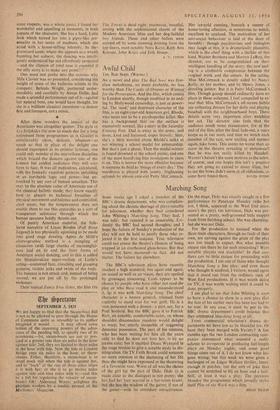March mg Song
Sonar: weeks ago I asked a Member of the BBC's drama department, who was -complain- ing about the chronic shortage of plays suitable for television, whether they had considered John Whiting's Marching Song. They had, I was told: but rejected it as unsuitable. Evi- dently the BBC had second thoughts; and I hope the failure of Sunday's production of the play will not be held to justify those who re- jected it in the first instance. True, television could not create the theatre's illusion of being trapped in an overheated glass-house. But that would not have • Mattered—in fact, did not matter. The failure lay elsewhere.
The BBC's television plays have recently reached a high standard; but again and again, on sound as well as on vision, they are spoiled by grotesque miscasting. Casts appear to be chosen by people who have either not read the play or who Have read it and misunderstood it. So it was with Marching Song. the chief character is a beaten general, released from captivity to stand trial for war guilt, Ile is a man possessed with a demon : a part, say, for a Paul Scofield. But the BBC gave it to Patrick Barr, an amiable, comfortable actor, on whose shoulder disconsolate maidens would delight to weep, but utterly incapable of suggesting doemanic possession. The part of his mistress, who has been waiting for him all the years only to find he does not love her, is by no means easy; but it enabled Diana Wynyard in the stage version to give a,notable study in dis- integration. On TV Faith Brook could summon no more emotion at the shattering of her life than she might have expressed at the shattering of a favourite vase. Worst of all was the choice of the girl for the part of Dido. Dido (it is made clear in the dialogue) is not pretty; she has had her face scarred in a bar-room brawl; but she has the wisdom of the garret, if not of the gutter—with its attendant attractiveness.
On the stage, Dido was exactly caught in a fine ,performance by Penelope Munday (who has not, I think, appeared in the West End since. more's the pity). On television, Did() was pre- sented as a pretty, well-groomed little moppet fresh from finishing school. She was charming: but she was not Dido.
For the production to succeed when the three main characters, through no fault of their own, are carving against the grain of the play was too much to expect. But what possible excuse can there be for such miscasting? Were suitable players not available? In that case there can be little excuse for proceeding with the production. I am one of those who thought Marching Song a fine play: and even those who thought it misfired, I believe, would agree that it stood out from the ordinary ruck of West End productions. If it was worth doing On TV, it was worth waiting until it could be done properly.
I am glad to see that John Whiting is soon to have a chance to show in a new play that the fate of his earlier ones has been too bad to be true. In any case, it must be put to the BBC drama department's credit balance that they attempted Marching .Song at all.
From commercial television's drama de- partments we have less to be thankful for. Or have they been merged with Variety? A few months ago the two London contracting com- panies announced what sounded a noble scheme to co-operate in producing full-length plays on. Monday nights; and some good things came out of it.. I do not know what has gone wrong; hut this week we were given a burlesque of an Edgar Wallace thriller, funny enough in patches, but the sort of joke that cannot be stretched to fill an hour and a hall'. Still, at least it was a play. The previous Monday the programme which proudly styles itself Play of the Week was a film.


































 Previous page
Previous page